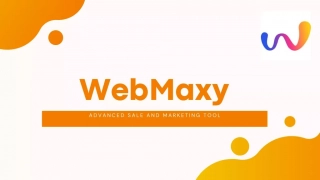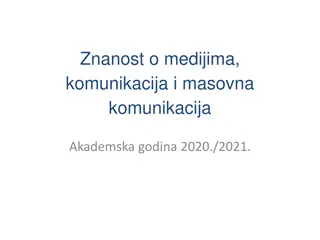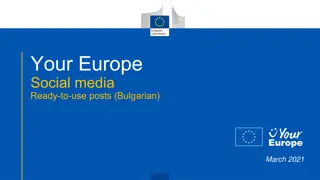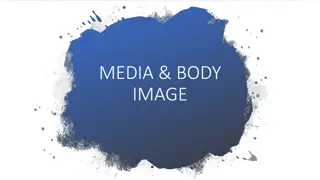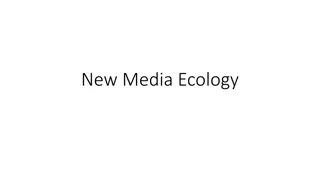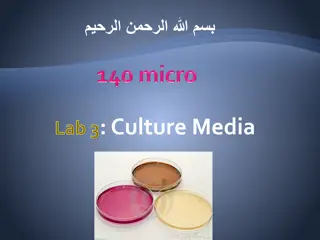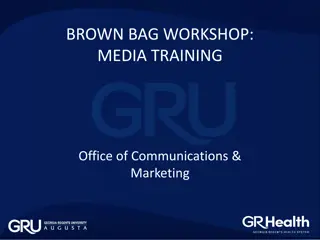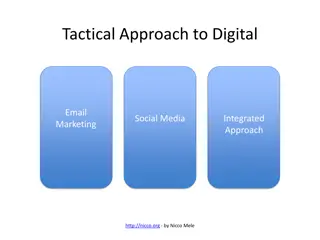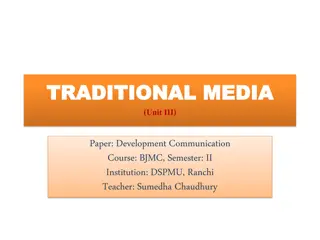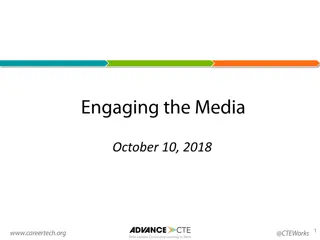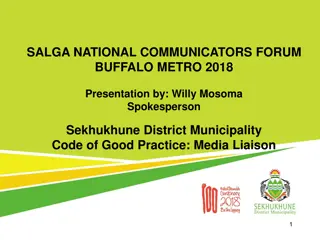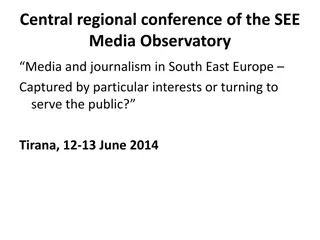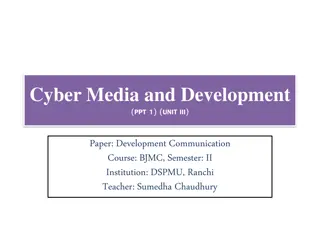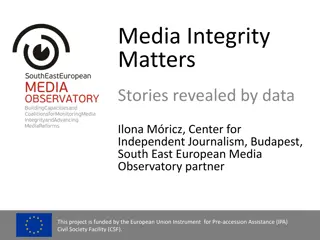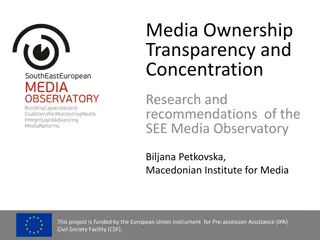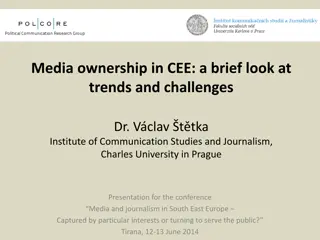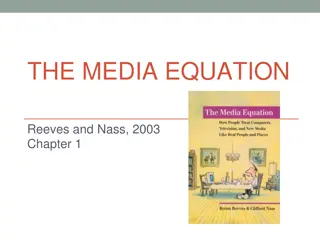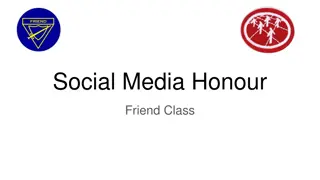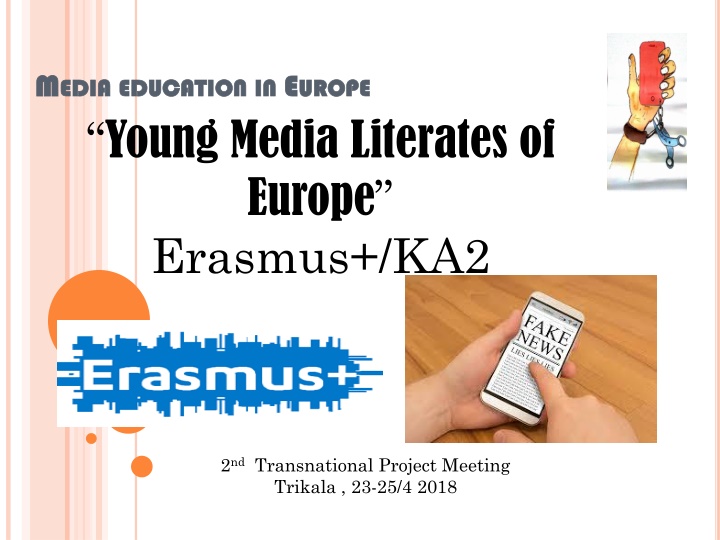
Media Education in Europe: Challenges and Progress
Explore the concept of media education and its importance in the digital age, focusing on Bulgaria's development in media literacy. Discover the historical background, educational trends, and key initiatives shaping media education in Europe.
Download Presentation

Please find below an Image/Link to download the presentation.
The content on the website is provided AS IS for your information and personal use only. It may not be sold, licensed, or shared on other websites without obtaining consent from the author. If you encounter any issues during the download, it is possible that the publisher has removed the file from their server.
You are allowed to download the files provided on this website for personal or commercial use, subject to the condition that they are used lawfully. All files are the property of their respective owners.
The content on the website is provided AS IS for your information and personal use only. It may not be sold, licensed, or shared on other websites without obtaining consent from the author.
E N D
Presentation Transcript
M MEDIA EDIA EDUCATION EDUCATION IN Young Media Literates of Europe Erasmus+/KA2 IN E EUROPE UROPE 2ndTransnational Project Meeting Trikala , 23-25/4 2018
WHAT IS MEDIA EDUCATION? Media education is the process through which individuals become media literate able to critically understand the nature, techniques and impacts of media messages and productions. Media education isn t about having the right answers: rather, it s about asking the right questions. Because media issues are complex and often contradictory and controversial, the educator s role isn t to impart knowledge, but to facilitate the process of inquiry and dialogue.
MEDIA EDUCATION In the digital age, the principles of media education are the same as they ve always been, but the existence of cyberspace is adding new and challenging questions. How, for instance, does technology affect how we relate to others? Is new technology enriching or undermining culture, learning and a sense of community? What roles do ownership, control and access play? What are the challenges in regulating a global, borderless medium like the Internet?
MEDIA EDUCATION IN BULGARIA Media literacy education is a relatively new trend in theBulgarian educational system It is based on an access to and participation in all media - traditional and new and involves obtaining skills for understanding of media content, as well astheir interpretation and critical reflection in different contexts.
Historical background: This discipline has developed under different names, such as mediapedagogy, media literacy, media education, etc. Initially the preferred term in Bulgaria was media pedagogy , but later on media literacy widely accepted.
An important step in the development and understanding of mediaeducation has been the Bologna process2 (which began in 1999; that same year, Bulgaria signed the Bologna Declaration), underwhich the university system of Bulgaria has been coordinatedwith regard to other European countries
In the National Program of Information and Communication Technologies (ICT) in Schools (2006) the Parliament has emphasized the need for providing media education for people of all ages and developing their skills for dealing with Internet and the new media. In response to the European reports and recommendations concerning media literacy and theEuropean program 2020, a series of strategies, programs, plans,etc., have been designed and published by the government Peicheva D., Milenkova V. - ERIES Journal vol. 9 no. 1
MEDIA EDUCATION IN GREECE Media Education is integrated in the Greek national curriculum in both Primary & Secondary Education as a cross-curricular module under the umbrella of Environmental, Health Education, Social & Civic, Politics & Law Studies focusing on the production of Media rather than their critical approach
The MoE introduced in 2010, the action Excellence and Innovation in Education aiming to enrich and empower the educational process through rewarding and public highlighting of best practices of innovation and creativity developed at schools. To this end, 100 school units and teachers have been distinguished and promoted in 2013 (EYE, 2013).
Pre-primary & primary education MoE encourages the development of Media projects in the framework of Environment and Health Education, e-twinning, and Flexible Zone projects and provides teachers that are interested in the production and use of Media in their teaching and learning activities with training materials.
Secondary education Within the context of School Activities, special programs are implemented in the framework of Career, Environment, or Health Education and Culture. They have an innovative character promoting pupils creativity, due to the educational methods as role playing, researching, brainstorming, team working and the active engagement of pupils and last for at least five months.
Since 2012-2013 school years, students in General and Vocational Upper Secondary Schools have been introduced to Research Projects as a separate component integrated in the Curriculum after more than 10 years of their pilot use in classrooms. Research projects are obligatory and students are free to choose the topic of their research from the disciplines of Humanitarian and Social Sciences, Arts and Culture, Mathematics, Physical Sciences and Technology, Environment and Sustainable Development, or from combining these fields
Teachers Training In Greece, issues of utmost importance regarding teachers and education staff are the Initial teacher education, conditions of service, continuing professional development, referenced to Law Upgrading teacher s role establishment of assessment and meritocracy rules in education and other provisions

